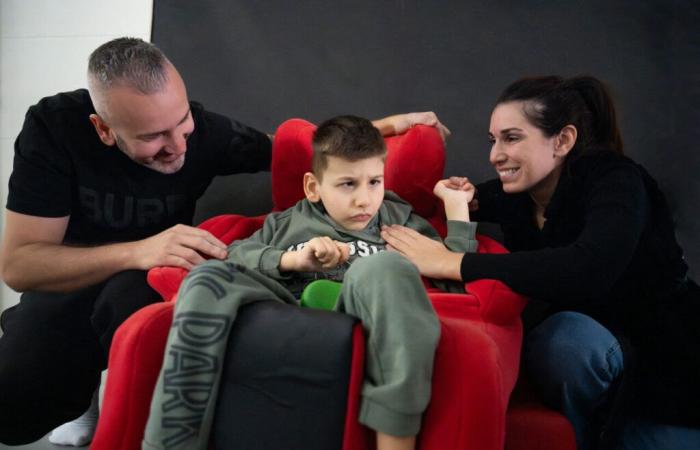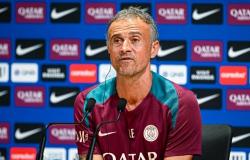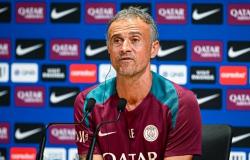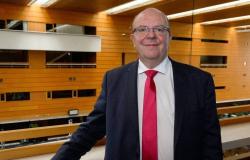
Par
Editorial Clisson
Published on
Nov. 29, 2024 at 10:45 a.m.
See my news
Follow L’Hebdo de Sèvre et Maine
Upon our arrival at the family home in La Planche (Loire-Atlantique)Thiago is playing, sitting on the ground, his back and head leaning against Laura, his specialized educator who comes every Monday morning to take care of him.
It was at the age of three months that the first sign alerted his parents. Thiago does not “pass” an eye test, which involves following a target with his eyes. Three months later, a first MRI informed them of potential blindness. This was followed by long periods spent at the Early Medico-Social Action Center (CAMSP) in Nantes. From 8 months to 6 years old, little Thiago will be followed by specialists of all kinds, ophthalmologists, ENT doctors, physiotherapists, orthoptists, etc.
At 2 years old, while children his age develop speech, Thiago does not turn around on his own, and cannot walk or even crawl. He also only communicates through vocalizations that only his parents can decipher. And despite genetic testing, no diagnosis is made.
We were in a sort of medical spiral, following what we were told, trusting the doctors, without knowing what was the cause of his disability.
It was only when he was five years old and after another brain MRI that a first answer was given to them: Thiago would suffer fromcerebellar atrophy. The problem would therefore be neurological but the causes of this atrophy are not yet known.
A mother who became a family caregiver
If Melinda continues her job as a hairdresser for a while, very quickly the rhythm becomes complicated to follow between all the medical appointments, the multiple steps to get help and the many things to learn and understand about multiple disabilities. “Acceptance of the illness also took a long time, it was a long journey,” admits the mother who stopped her work and then became family caregiver to devote themselves entirely to their child, a very regulated legal status.
Thiago spends a few hours a week from the ages of 3 to 6 in an inclusive MAM in Maisdon-sur-Sèvre (“A world of my own”) where disabled and able-bodied children rub shoulders. A structure that allows Thiago to socialize and the parents to breathe a little. Even if Melinda admits to having trouble letting go. “My children are my priority, I will take time for myself later,” she summarizes.
Permanent support
For a year, Thiago has been followed by a SESSAD (Special Education and Home Care Service), whose multidisciplinary team works to meet the specific needs of each child. Thus, an occupational therapist, a specialized educator and a social worker are available for the needs of the family. And Thiago has a ministerial schedule : on Monday Laura comes to take care of him, on Tuesday and Thursday it's Anaëlle the speech therapist who helps him progress with different therapies, on Friday he works on the rehabilitation of his eyes with an orthoptist. Not forgetting the physiotherapist who comes once or twice a week.
In multiple disabilities, every victory counts. Thiago now knows how to express himself and communicate with his parents. “We know what he wants, what he likes or not,” they assure. And the communication work with pictograms set up by the speech therapist seems to work with the outside environment.
A support and awareness association
In October 2021, Melinda and Mathieu founded the association “Le p'tit monde de Thiago”. An initiative supported by their family since Melinda's father is the president, her sister the secretary, her mother the treasurer, not forgetting her sister-in-law and brother-in-law who are both involved as volunteers.
At first, Melinda wasn't keen on the idea. “I didn’t want to beg, we wanted to fend for ourselves,” she explains, before understanding that beyond themselves, it would also have an interest in their eldest Mathéo that they did not want to exclude.
Moreover, when asked about the relationship between the two brothers, the parents speak of a “hyperfusional relationship” even if they logically recognize that Mathéo “took time to accept the illness”. Communication between them was essential, the eldest was able to verbalize his fears or his pain, such as that of not being able to play “normally” with his little brother.
“With multiple disabilities, everything is much more expensive”
If the primary objective of the association is to raise awareness and inform about multiple disabilitiesby participating in particular in events or demonstrations, it also allows them to help finance equipment for their son. Because “multiple disabilities are only tailor-made, so everything is much more expensive”.
For the purchase of an adapted car seat and a wheelchair, the family had to pay €5,500. And to get financial help, you have to accept a lot of steps, hours putting together files and the need to advance certain costs. For example, an adapted car would be useful but it costs around 50,000 euros where the MDPH only finances 10,000 every ten years.
The association's next important event will be a concert given in Montaigu in March 2025. Before that, it will be present at the Saint-Fiacre Christmas market on December 7 and 8. “We continue to talk about disability, to talk about our son who remains a child who can play, be amazed and laugh,” conclude his parents, carried by love.
Follow all the news from your favorite cities and media by subscribing to Mon Actu.





